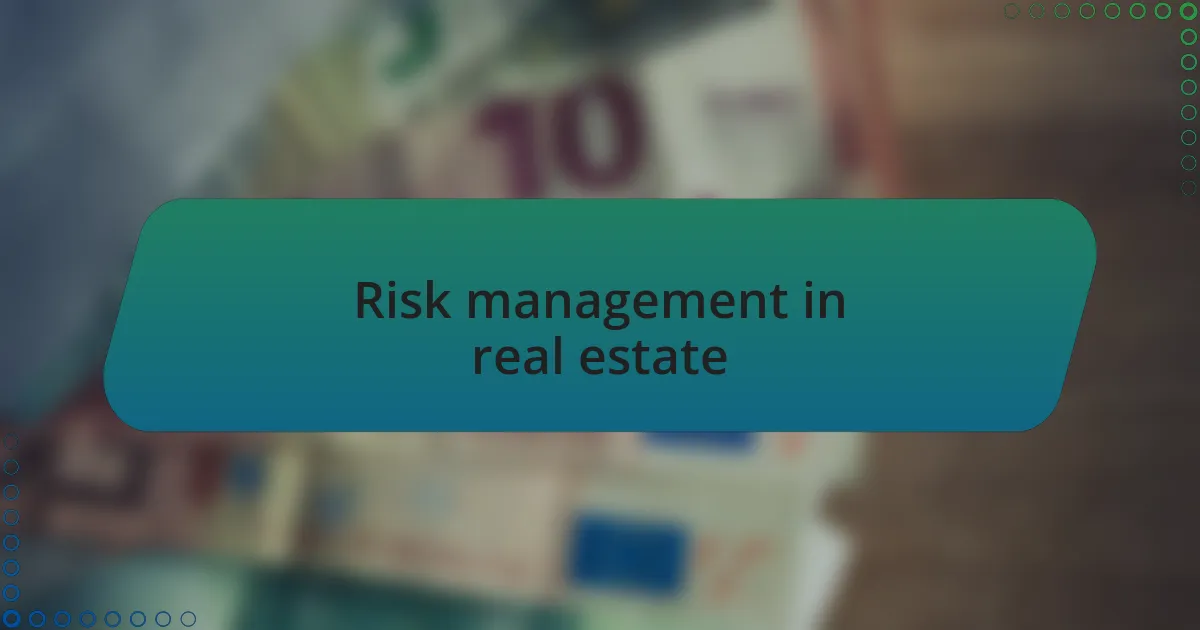Key takeaways:
- Investment consulting is crucial for tailored asset allocation strategies and adapting to market changes.
- Real estate investments offer potential appreciation, steady income through rentals, and serve as a hedge against inflation.
- Understanding local market trends and factors like location, property condition, and demand are vital for successful property valuation.
- Proactive risk management, thorough research, and networking are essential for successful real estate investment strategies.
Overview of investment consulting
Investment consulting is a sophisticated field that guides individuals and organizations in making informed asset allocation decisions. I remember my first encounter with a consultant; it felt like opening a treasure chest filled with strategies I had never considered. Is there anything more reassuring than knowing you have a knowledgeable partner simplifying the complex investment landscape for you?
At its core, investment consulting is about tailoring strategies to meet specific financial goals, whether that’s retirement planning, wealth accumulation, or risk management. I’ve found that a good consultant not only analyzes market trends but also deeply understands their clients’ unique situations and aspirations. This personalized approach often leads to more confident decision-making and better investment outcomes.
Through ongoing market evaluations and performance reviews, investment consulting helps clients adapt to changing economic conditions. I often reflect on how crucial this adaptability was during economic downturns I’ve navigated. Have you ever felt overwhelmed by market volatility? A consultant can transform that feeling into a proactive strategy, turning uncertainty into opportunity.

Importance of real estate investments
Real estate investments hold a unique place in a diversified portfolio. I vividly remember a moment when I first dipped my toes into property investment; it felt like discovering a solid anchor amidst the sea of stocks that often felt unpredictable. Have you ever considered how real estate can provide not just potential appreciation but also a steady income stream through rentals? It’s these characteristics that can offer reassurance during tumultuous economic times.
Furthermore, investing in real estate can serve as a hedge against inflation. In my experience, properties tend to appreciate over time, often outpacing inflation rates. I recall a property I purchased years ago that has not only increased in value but has also provided a reliable cash flow, which has been invaluable in moments of financial uncertainty. Isn’t it comforting to know that your investments can work for you while you sleep?
Lastly, real estate investments can foster community development and contribute to a sense of belonging. When I invested in my first multifamily unit, I witnessed firsthand how it brought together diverse families and improved the neighborhood’s vitality. Have you ever thought about the impact your investment could have beyond just financial gains? Real estate is more than just numbers; it’s about creating living spaces that can positively influence lives.

Understanding real estate market trends
Understanding the shifts in real estate market trends requires a keen eye. I still remember the time I noticed an uptick in demand for urban living spaces, driven by changing preferences during the pandemic. Have you tracked how remote work has transformed buyer desires? It’s not just about locations anymore; it’s about lifestyle shifts that can reshape entire neighborhoods.
One key aspect I’ve observed is the importance of local indicators, such as employment rates and population growth. For instance, when I invested in a town with a burgeoning tech scene, I felt the excitement in the air—new businesses sprouting and young professionals flocking to the area. It’s fascinating how these trends can signal future appreciation. Don’t you think understanding these local dynamics can give us a meaningful edge in making investment decisions?
Making sense of market fluctuations can be daunting, but I find that staying informed about interest rates is crucial. When I bought my last property, rates were at an all-time low, giving me a fantastic opportunity to lock in a manageable mortgage. Seeing how these financial shifts can immediately impact purchasing power makes me curious: how often do we ponder the ripple effects of broader economic policies on our investments?

Key factors in property valuation
One of the leading factors in property valuation is the location. I remember my first investment in a suburban area that was just a few miles from the city center. The appeal of being close to work while still enjoying a quieter environment made the property incredibly desirable. Have you ever considered how much a mere zip code can elevate a property’s value?
Another critical component is the condition of the property. During a recent renovation project, I discovered firsthand how updating kitchen appliances and freshening up the landscaping transformed the entire vibe of the home. It was amazing to see how what seemed like a small investment in aesthetics resulted in a significant increase in valuation. Doesn’t it feel rewarding when a little effort leads to such impactful financial returns?
Lastly, market demand plays a crucial role. There was a day when I listed a property during a peak buying season, and the offers came flooding in. The excitement in the air was palpable, and it reminded me that timing can indeed be everything in real estate. How often do we underestimate the power of buyer sentiment in determining value?

My investment strategy overview
In my investment strategy, I focus heavily on thorough research and analysis before making any decisions. One of my early experiences taught me the importance of digging deep into market trends. I remember spending hours poring over data and reports, and those dedicated weeks resulted in the successful acquisition of several undervalued properties. Have you ever realized how a single piece of overlooked data could make or break an investment?
Networking is another cornerstone of my approach. I once struck up a conversation with a fellow investor at a local meetup, and it turned into a fruitful partnership. That day reinforced for me how building relationships within the industry can unlock hidden opportunities and insights. How often do we forget the value of community in a field that thrives on connection?
Moreover, I always assess each investment in terms of its long-term potential rather than immediate returns. There was a time I hesitated to buy a property that needed significant work; however, my gut told me it had excellent growth potential. Investing in future value sometimes requires patience, but the rewards can be incredibly fulfilling. Are we not all looking for investments that stand the test of time?

Risk management in real estate
When it comes to risk management in real estate, I believe that a proactive rather than reactive approach is essential. Early in my career, I encountered a property that seemed like a dream investment until I discovered its zoning issues. This taught me that understanding local regulations can prevent costly surprises down the line. Have you ever considered how much local laws can impact your investment’s viability?
Equally important is personal cash flow analysis. I once jumped at an opportunity for a fixer-upper that I thought would yield great profits. However, I didn’t fully account for the renovation budget, and my cash flow tightened significantly during the project. This experience underscored the necessity of keeping a reserve for unexpected expenses. Isn’t it intriguing how a simple miscalculation can shift your entire financial strategy?
Incorporating insurance into my risk management plan has saved me from potential disasters. After a tenant caused damage to one of my properties, having comprehensive landlord insurance allowed me to cover repair costs without financial strain. It’s a reminder that preparing for the unexpected can save not just money but also peace of mind. How prepared are we for the unexpected in our investment journeys?

Tips for successful property acquisition
Finding the right property is like dating: you need to do your research before making a commitment. I remember a time when I felt rushed to purchase a property because it seemed like a good deal. I quickly realized that taking the time to explore the neighborhood and assess future developments made all the difference in securing a valuable asset. When’s the last time you took a step back to really analyze the area surrounding a potential investment?
Don’t underestimate the power of networking in real estate. I once met an investor at a local seminar who introduced me to a reliable contractor, which turned into a partnership that saved me thousands on renovations. Building relationships can uncover opportunities that are often not listed on the market. Have you ever considered how much influence a good connection can have on your investment success?
Thorough due diligence is non-negotiable for successful property acquisition. Early on, I overlooked a property’s pending legal issues, thinking they wouldn’t be a big deal. It was a wake-up call when those issues complicated the sale and drained my resources. Does the idea of skimming this essential step resonate with you as a potential pitfall in your own investment plans?







